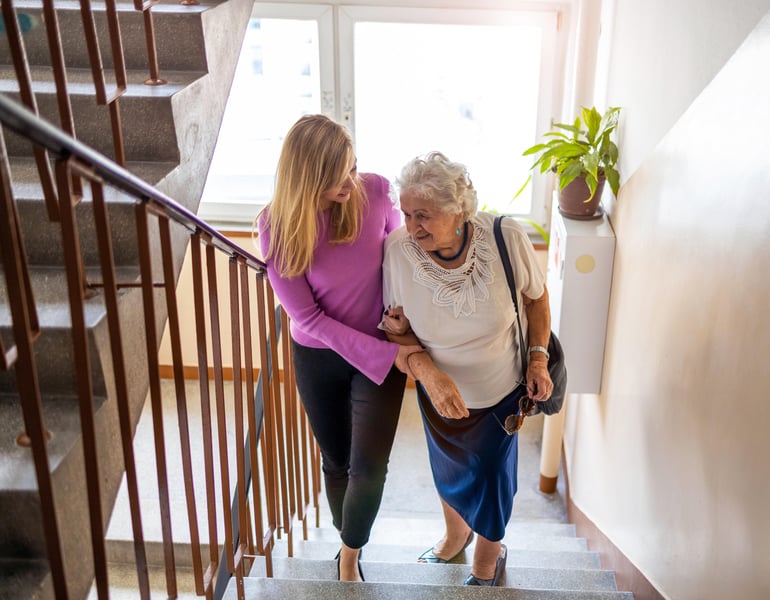Submit your contact info here or click the "Contact me about Sync" button below and we will reach out to you with more information.
Get Healthy!

- Miriam Jones Bradley, RN
- Posted March 30, 2023
How to Prevent Falls: Tips for Older Adults
For older Americans, a fall is no laughing matter.
According to the National Council on Aging, more than 1 in 4 people over age 65 fall each year, and falls are the leading cause of fatal and non-fatal injuries among the elderly. However, falls are not a normal part of aging.
So why do the elderly fall more often? Common causes of falls in the elderly include issues such as poor eyesight, hearing loss, decreased strength, chronic health problems, balance and gait issues, medications and environmental factors.
Here are specific actions seniors and their families can take to lower their fall risk in the home. First, experts will give advice on how to prepare homes with fall prevention in mind. Then, they will offer additional steps to reduce your risk of taking a tumble.
Fall-proof your home
Recent research published in the Cochrane Database of Systematic Reviews found that taking measures to reduce falls at home decreased falls by 38% in high-risk people.
"Falls are very common among older people. They can cause serious injury or even death, but they are preventable. In this review, we wanted to examine which measures could have the biggest impact on reducing falls among older people living at home," study author Lindy Clemson, professor emeritus at the University of Sydney in Australia, said when the research was published.
Here are several tripping hazards that should be addressed in a home, according to the Mayo Clinic.
- Remove clutter from the floor, especially in walkways
- Remove throw rugs or secure them to the floor
- Keep items off the stairs
- Keep pet accessories out of pathways
- Remove electric cords from the walkway
- Keep the path clear to light switches
- Clean spills up immediately.
Next, here are some items that will help reduce falls:
- Place night lights in the bathroom and along the route from the bed to bathroom
- Keep a lamp at the bedside to turn on before getting up
- Install a handrail on both sides of the stairs
- Have a light switch placed at the top and bottom of the stairs
- Place anti-slip treads in your shower stall and bathtub
- Install grab bars in the shower and beside the toilet
- Consider using a shower/tub chair
- Keep frequently used items within reach, to avoid the need for a footstool.
Meanwhile, the U.S. National Institute on Aging offers additional home modifications that may be helpful.
What else can you do to prevent falls in the elderly? According to Mayo Clinic, in addition to the changes above, there are several other helpful steps seniors can take to prevent falls.
- Make an appointment with your physician to discuss your fall risk and any medications or health issues that might make you more vulnerable to falls. Ask about physical therapy or occupational therapy if you do not feel safe exercising alone.
- Stay active -- the National Council on Aging also addresses exercise and falls. Often, seniors decrease their exercise out of a fear of falling, when in reality one of the best things they can do is to keep moving. Exercise will help maintain muscle strength and joint mobility, as well as good balance, which is crucial for preventing falls. There are many community-based programs specifically geared toward building and maintaining muscle strength, as well as fall prevention. The YMCA and other fitness facilities also provide opportunities for seniors.
- Using canes, walkers and wheelchairs, when needed, can be valuable in preventing a fall. If you borrow a walker, ask your doctor or occupational therapist to help you make sure it is the right size for you.
- Stay up to date on hearing and vision checks.
- Wear sensible shoes with good support and low heels.
- When getting up, take a minute to sit on the edge of the bed before standing. Some medications can make you dizzy and this can cause a fall.
While falls are a serious matter and something to avoid, the fear of falling should not prevent you from living a full and active life. With a few modifications to your home, continued exercise and activity, and increased awareness of risks and prevention, seniors can enjoy their life with confidence.







